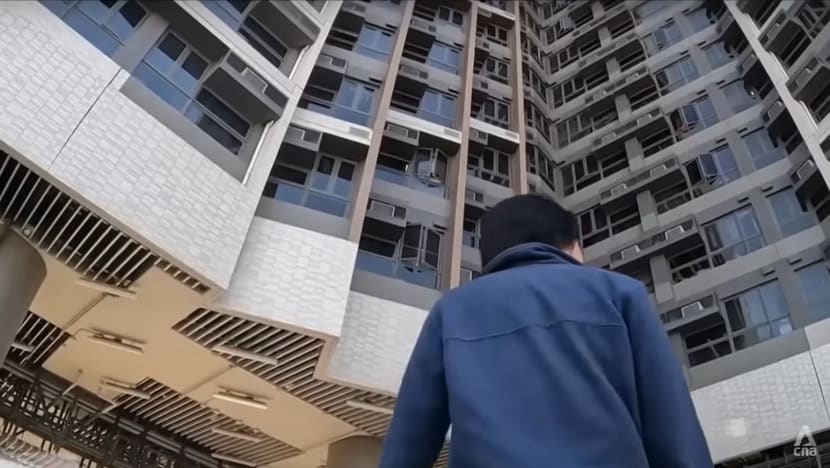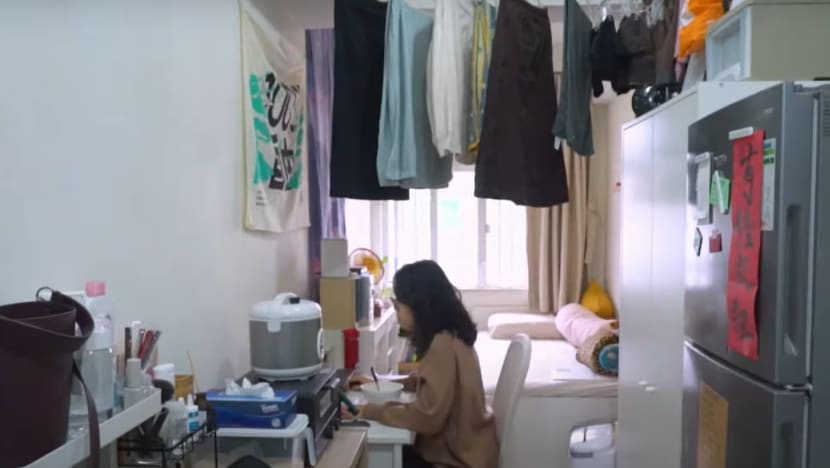Some young Hong Kongers turn to youth hostels as housing crisis persists
The average wait time for public housing in Hong Kong is currently 5.8 years.

Hong Kong resident Morgan Chan, 26, at his youth hostel on the outskirts of the city.

This audio is generated by an AI tool.
HONG KONG: Mr Morgan Chan dreams of having his own place, but sky-high property prices have led him to an alternative – a government-funded youth hostel.
The 26-year-old Hong Konger pays about US$447 a month for his room with shared facilities, about half of what a single room would cost in the same area.
Tenants like him can live in the hostel for up to five years, with hopes of saving enough money for a down payment for a future home.
But Mr Chan doubts that will happen.
“Is (five years of savings) enough to buy a proper house in Hong Kong?” he questioned.
“Maybe if the housing market comes down a little bit? Maybe it will help but I still can't see buying (a) space downtown.”
Home ownership in Hong Kong remains almost unattainable today for young people, even with the recent scrapping of property curbs.
Property prices are a big obstacle for many – an average household will have to save every cent of its earnings for nearly 19 years to afford a home.
The ratio of the median home price to the median annual income in Hong Kong has come down slightly in recent years, but it still stood at 18.8 according to a 2023 survey, making the city one of the world’s most unaffordable housing markets.
In February, the government scrapped all property transaction taxes in a bid to boost the sluggish housing market. This led to a drop in home prices.
However, with interest rates expected to remain high, buyers are still holding back.
YOUTHS ATTEMPT TO SAVE FOR FUTURE HOUSING
In 2022, Chinese President Xi Jinping called for young Hong Kongers to receive help in housing purchases, studies, employment, and entrepreneurship.
“Hong Kong will only prosper when its young people thrive,” he said.
Shortly after that, a project to provide young people with affordable and better quality housing in the city kicked into higher gear – including Mr Chan’s youth hostel, located on the outskirts of the city.
Meanwhile, another type of housing in Hong Kong has attracted scores of negative headlines over the years.
Many people, including youths, have turned to subdivided flats or cage homes due to insufficient housing supply. The current average wait time for public housing is 5.8 years.
More than 214,000 people live in such cramped, tiny apartments – some the size of a parking lot, with Ms Sophie Li being one of them.
The 32-year-old’s family members had either passed away or left Hong Kong by the time she graduated from university, leaving her to find a place of her own, she told CNA.
She capped her housing expenses to one-third of her income, at about HK$6,000 (US$766) a month. A subdivided flat was the only viable option for her budget if she wanted to stay relatively close to the city centre.
“I earn around HK$20,000 per month, and the rent here is HK$5,300. It’s about HK$5,500 per month if I include water and electricity. Every month, I can have a few thousand dollars in savings,” added Ms Li, who works in the media industry.
Ms Zerlina Zeng, head of East Asia corporates at financial research firm CreditSights, told CNA’s East Asia Tonight programme that despite government intervention, housing remains out of reach for young residents.
Hong Kong authorities have made efforts to increase the availability of land for both private and public homes.

DIFFICULT TO DATE WHILE IN YOUTH HOSTEL
For Mr Chan, a youth hostel was the best option as renting his own place would be too expensive.
While the hostel gives him a sense of community and offers activities to attend, he said having a relationship while living there has proven “quite difficult” due to a cap of five overnight visits per month – a restriction unique to his hostel, with other places having their own rules.
Hong Kong’s fertility rate remains one of the lowest in the world. To encourage births, the government offers a cash bonus for young families and prioritises subsidised housing for young couples with a newborn.
But given the long wait for public housing, many couples turn to the rental market, continuing the vicious circle.
Ms Li said she would leave Hong Kong in the future if she gets an opportunity, and that she would not want to deal with the financial burden of owning a home.
Some youths like her have also changed their minds on the importance of home ownership under the current social atmosphere. “I wouldn't want to promise myself that I'll stay in Hong Kong for several decades,” she added.
A 300 sq ft flat, she pointed out, sells for about HK$4 million now.
When asked if she could afford one, she responded: “Maybe not in my lifetime.”
















